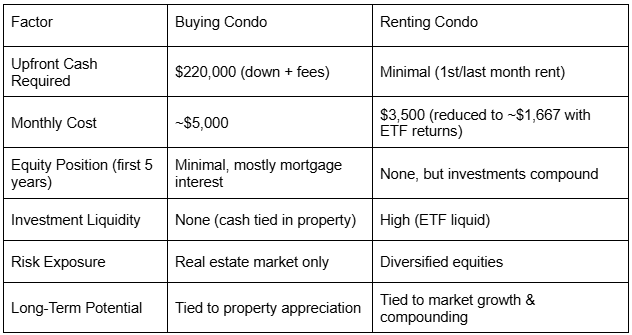Toronto’s real estate market has a reputation for being one of the most competitive — and most expensive — in North America. For many buyers, the dream of owning is tied not only to stability and pride of ownership, but also to the belief that real estate is the ultimate wealth-building vehicle. But with sky-high property prices, steep carrying costs, and alternative investment opportunities, the question arises: does owning in Toronto always make financial sense compared to renting?
Using real-world tools like HouseSigma, which provides property listings with rental analysis, cash flow calculators, and mortgage projections, it becomes clear that the numbers often tell a different story than the “always buy” mantra. Let’s break down a scenario that highlights the true cost of owning vs. renting in Toronto.
The Case Study: A $1 Million 2-Bedroom Condo
Imagine spotting a $1,000,000 two-bedroom condo in downtown Toronto. It’s relatively large by shoebox standards – 1,000 square feet – and complemented by great building amenities like a pool, a gym, and a party room. The management is flexible while the maintenance fees are low. Any investor, live-in owner, or renter’s dream.
The numbers look like this:
- Purchase Price: $1,000,000
- Down Payment (20%): $200,000
- Closing Costs (Legal + Land Transfer Tax): Approx. $20,000
- Mortgage & Carrying Costs: Roughly $5,000/month (including property taxes + maintenance fees)
On the rental side, HouseSigma shows that a comparable two-bedroom condo rents for approximately $3,500/month.
At first glance, the gap between $5,000 and $3,500 doesn’t seem overwhelming. But when you factor in opportunity cost, the picture shifts dramatically. Let’s run through both routes – buying and renting – in an example scenario for the Toronto real estate market.
Option 1: Buying a Toronto Condo
As a buyer, you need upfront cash of about $220,000 (down payment + closing costs). This capital is now tied up in the condo, leaving less flexibility for other investments.
Your monthly cash commitment is around $5,000. While a portion goes toward building equity, in the first few years of the amortization schedule, almost everything is swallowed by interest. Meaningful principal repayment doesn’t happen until much later in the mortgage term.
The upside? If the condo appreciates significantly above historical averages, you may see strong returns — but that hinges on future market performance, which has slowed in some Toronto segments.
Financial outlook:
- Monthly Outflow (mortgage, maintenance, taxes): $5,000
- Equity Gain (first few years): Minor, mostly interest payments
- Investment Flexibility: Low (cash tied in property)
Option 2: Renting a Toronto Condo
Instead of purchasing, you rent for $3,500/month, instantly saving $1,500 a month compared to owning. More importantly, your upfront $220,000 stays liquid and can be invested.
Take an example: you invest that $220,000 into a broad-market fund like Vanguard’s S&P 500 ETF, which has historically returned 10–15% annually over the last decade. Even at the lower end (10%), that’s a growth of $22,000/year without touching your principal. That annual return equates to approximately $1,833/month in investment income, effectively reducing your net cost of renting from $3,500/month to about $1,667/month.
If you reinvest the gains (compound growth), the advantage widens further over time – and if you invest within a TFSA, those returns could be entirely tax-free.
Financial outlook:
- Monthly Rent: $3,500
- Offset via Portfolio Returns (10% on $220k): ~$1,833/month
- Net Effective Rent: ~$1,667/month
- Investment Flexibility: High (cash remains liquid and diversified)
Side-by-Side Comparison

Our case study above illustrates a critical truth all prospective investors must recognize: buying doesn’t always beat renting. That’s especially true considering the opportunity cost of a down payment on any price-inflated Toronto condo. While ownership offers long-term stability and potential appreciation, the immediate, large financial commitment can hinder wealth-building in other ways.
The real decision, then, is not just own vs. rent, but own vs. rent and invest. For someone with the discipline to invest their capital and monthly savings, renting in Toronto may actually lead to greater long-term wealth than owning at today’s price levels.
There’s Another Option In Airbnb
Airbnb hosting offers a third pathway for Toronto property owners who want to maximize returns compared to traditional renting or living in their unit. Short-term rentals have the capacity to generate meaningful extra income for those able to navigate Toronto’s strict regulations and seasonal patterns.
How much? The average Toronto Airbnb host offering their property as a short-term rental for 180 nights or less, per City of Toronto restrictions, earned approximately CA$37,000 between June 2024 and May 2025. Medium-level hosts booked about 248 nights and achieved a 68% occupancy rate at an average daily rate of CA$161. That’s taking the 180-night short-term rental limit and additional 28+ night bookings into account. At such a rate, these investors earned $6,000 per month on average. Higher-performing properties in desirable downtown neighborhoods can earn significantly more.
It’s case-specific; cost-efficient real estate of any kind calls for due consideration, financial planning, and personal confidence.




